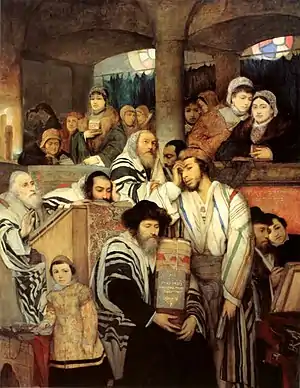Yoma
Yoma (Aramaic: יומא, lit. "The Day") is the fifth tractate of Seder Moed ("Order of Festivals") of the Mishnah and of the Talmud. It is concerned mainly with the laws of the Jewish holiday Yom Kippur, on which Jews atone for their sins from the previous year. It consists of eight chapters and has a Gemara ("Completion") from both the Jerusalem Talmud and the Babylonian Talmud.[1]
 | |
| Tractate of the Talmud | |
|---|---|
| Seder: | Moed |
| Number of Mishnahs: | 61 |
| Chapters: | 8 |
| Babylonian Talmud pages: | 88 |
| Jerusalem Talmud pages: | 42 |
| Tosefta chapters: | 4 |
Content
The first chapter is regarding the seven days before Yom Kippur in which the Kohen Gadol is separated from his wife and moves into a chamber on the Beit HaMikdash, sprinkled with water from the Red Heifer and taught the laws relating to the Yom Kippur sacrifices.
The second through seventh chapters deal with the order of services on Yom Kippur, both those specific to Yom Kippur and the daily sacrifices. Some of the issues addressed include those of the lottery employed to assign services to Kohanim, laws regarding the scapegoat, and the incense sacrifices performed by the Kohen Gadol in the Holy of Holies.[2]
The last chapter deals with the five afflictions of Yom Kippur, which apply in the absence of a Temple, including modern times. Five abstentions or strict avoidances are required:
- Eating or drinking
- Wearing leather shoes or things made from animals
- Anointing oneself with oil
- Washing
- Marital relations
The last chapter also discusses teshuva, or repentance (8:8-9).
References
- Joseph Jacobs; Jacob Zallel Lauterbach. "YOMA". jewishencyclopedia.com. Retrieved February 3, 2019.
A treatise in the Mishnah, in the Tosefta, and in both Talmudim, treating of the divineservice on the Day of Atonement, of the fasting ceremony on that day, and of other regulations pertaining to the occasion. In the Tosefta this treatise is entitled "Yom ha-Kippurim" (Day of Atonement), while in the Mishnah (ed. Lowe), as well as by Sherira Gaon, it is called simply "Kippurim" (Atonement). The Day of Atonement was known also as "Yoma Rabba" (The Great Day), often shortened to "Yoma" (The Day); hence this treatise was given the name of "Yoma" in the Mishnah as well as in the Talmudim. In most Mishnah editions the treatise is the fifth in the order of Mo'ed. It is divided into eight chapters, containing a total of sixty-one paragraphs.
- "Yoma, Introduction to Yoma". sefaria.org. Retrieved February 3, 2019.
External links
- English translation by Isidore Epstein in the Soncino Talmud (1938)
- Yoma in the Jewish Encyclopedia
- Yoma on Sefaria
